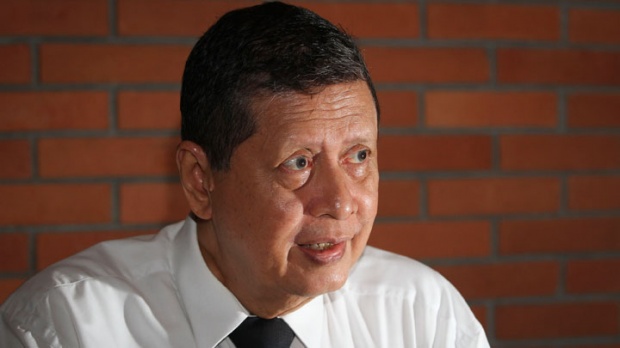Marzuki Darusman: We Start from the Problem, Not from Assumption
21 September 2017 12:08 WIB

TEMPO.CO, Jakarta - Escalation of violence in Rakhine—the poorest state of Myanmar—over the past three weeks has forced more than 250,000 of Rohingya civilians to flee their homes to Bangladesh. The exodus began on August 25 after Rohingya militants—the Arankan Rohingya Salvation Army (ARSA)—attacked police posts, killing 12 members of the security forces. In response, around 1,000 people—according to the United Nations (UN) report—were killed by the Myanmar security forces.
Five months before the deadly clashes occurred, the UN Human Rights Council had authorized a Fact-finding Mission to Myanmar. Indian Supreme Court advocate Indira Jaising initially chaired the Mission. By the end of July, Joaquin Alexander—President of the Council—named Marzuki Darusman to replace Jaising. “The appointment process was carried out at the Human Rights Council session,” Marzuki explained.
Marzuki Darusman, 72, is no stranger to conflicts and human rights violations. Having participated in the United Nations investigation into the assassination of former Pakistani prime minister Benazir Bhutto, he chaired a panel to write the report on Sri Lanka’s civil war. In August 2010, he was appointed UN Special Rapporteur on Human Rights in North Korea.
The former attorney-general of Indonesia was one of the first members of the National Commission on Human Rights. In the current mission, the UN seeks to find evidence of possible human rights violations by the military and the armed groups against the Rohingya civilians. “It is hope that we are able to track down those who must be held responsible,” Marzuki explained to Tempo.
Amid his busy schedule and the pressures of leading the Mission, Marzuki spoke to Tempo’s Raymundus Rikang, Reza Maulana and Purwani Diyah Prabandari in Fairmont Hotel, Jakarta, two weeks ago.
What was the Fact-finding Mission looking for in Rakhine?
In addition to collecting the latest update on the situation, we were mandated to investigate whether a series of events that recently unfolded in Rakhine fit the criteria of gross human rights violations, as stated in the previous report on Myanmar. The UN special rapporteur on Myanmar, Prof. Yanghee Lee from South Korea, asked our team to confirm if gross human rights violations occurred as alleged by the international community.
What are the criteria?
People tend to be dramatic and equate gross human rights violations with genocide. These are hastily-formed opinions. It must be investigated to prove the intention of an institution to deliberately wipe out a certain ethnic or religious group.
Are there any indications of gross human rights violations?
I have to be careful when talking about this. The UN report has noted that there were gross human rights violations in Myanmar.
How do you see it, personally?
The misery of being forced to flee your home country is already a human rights violation. Does it constitute a gross human rights violation? That’s what we are trying to find out.
Former UN Secretary-General Kofi Annan has also investigated violence against the Rohingya community. What is the difference between his team and yours?
Kofi Annan’s team was set up by the Myanmar government in joint cooperation with the Kofi Annan foundation based in Geneva, Switzerland. The team’s mandate is to give recommendations on the Myanmar government’s projected policies towards Rakhine. He is not obligated to report to the UN. But his report is highly valuable and is used as a reference by many international human rights institutions.
Can the Mission use Kofi Annan’s findings as a basis?
Kofi Annan’s report clearly states that Rakhine is facing three crises simultaneously: development, human rights and security crises. He also revealed an interesting discovery and wrote that “if development is carried out, then the human rights issue can be resolved; if the security situation is stable, then Rakhine can go back to its past glory.” He didn’t use these words to sweeten or spice up his report. This point was possibly made to answer speculations that the conflict was triggered by Rakhine’s natural resources.
What do you plan to prove in your investigation?
We are not looking for proof or facts about the incident, but more for explanations. Through these explanations, the team can find patterns in the incidents, which can then be linked to institutions or individuals responsible for the recent series of events.
How do you find patterns of a crime without collecting facts?
Facts in the context of the fact-finding team are explanations for the series of events. The team must be able to give good arguments to the UN Human Rights Council that the recent crisis in Myanmar did not stand alone. It was related to a string of similar occurrences over a certain period of time, resulting in a repetitive pattern of events. Eventually, we could pinpoint parties that could be held accountable.
What threshold is used to assess a given violence as a pattern?
Recurrence within five years. Less than that, it is considered as a single unconnected incident. In Myanmar’s context, we will trace back cases that occurred after it successfully held the 2011-2012 general elections which were won by the National League for Democracy.
Read the full interview in this week's edition of Tempo English Magazine























